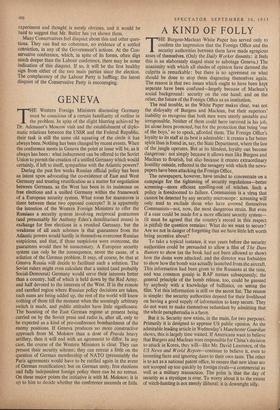A KIND OF FOLLY
THE Burgess-Maclean White Paper has served only to confirm the impression that the Foreign Office and the security authorities between them have made egregious asses of themselves. (Only the Daily Worker dissents: it feels this is an elaborately staged stunt to sabotage Geneva.) The unanimity with which all shades of opinion have damned the culprits is remarkable : but there is no agreement on what should be done to stop them disgracing themselves again. The reason is that two issues which ought to have been kept separate have been confused—largely because of Maclean's social background : security on the one hand; and on the other, the future of the Foreign Office as an institution.
The real trouble, as the White Paper makes clear, was not the disloyalty of Burgess and Maclean, but their superiors' inability to recognise that both men were utterly unstable and irresponsible. Neither of them could have survived in his job, let alone been promoted, but for the protection that being 'one of the boys,' so to speak, afforded them. The Foreign Office's loyalty to its staff at its best is admirable : it creates a far better spirit than is found in, say, the State Department, where the law of the jungle operates. But at its blindest, loyalty can become dangerous : not simply because it allows men like Burgess and Maclean to flourish, but also because it creates extraordinary hostility outside, reflected in the savagery with which the news- papers have been attacking the Foreign Office.
The newspapers, however, have tended to concentrate on a campaign for the tightening of security regulations—better screening—more efficient smelling-out of witches. Such a policy is foredoomed to failure. Communism is a virus that cannot be detected by any security microscope: screening will only tend to exclude those who have avowed themselves Communists—not, now, the most dangerous strain. But even if a case could be made for a more efficient security system— (it must be agreed that the country's record in this respect is pitiful) the question remains: What do we want to secure? Are we not in danger of forgetting that we have little left worth being secretive about?
To take a topical instance, it was years before the security authorities could be persuaded to allow a film of The Dann Busters to show (as the book had not been allowed to show) how the dams were attacked; and the director was forbidden to show how the bomb was actually launched from the aircraft. This information had been given to the Russians at the time, and was common gossip in RAF messes subsequently; the general principle of the bomb release, too, could be guessed by anybody with a knowledge of ballistics, on seeing the film. Yet this information is still on the secret list. The reason is simple : the security authorities depend for their livelihood on having a good supply of information to keep secure. They do not want to make themselves redundant by admitting that the whole paraphernalia is a farce.
But it is. Security now exists, in the main, for two purposes. Primarily it is designed to appease US public opinion. As the admirable leading article in Wednesday's Manchester Guardian shows, this is largely time wasted. If Americans want to believe that Burgess and Maclean were responsible for China's decision to attack in Korea, they will—like Mr. David Lawrence, of the US News and World Report—continue to believe it, even to inventing facts and ignoring dates to their own taste. The other is to act as a national patent office, to ensure that new ideas are not scooped up too quickly by foreign rivals—a commercial as well as a military transaction. The point is that the day of security as a mystique is over. To worry about it to the extent of witch-hunting is not merely illiberal; it is downright silly.


































 Previous page
Previous page